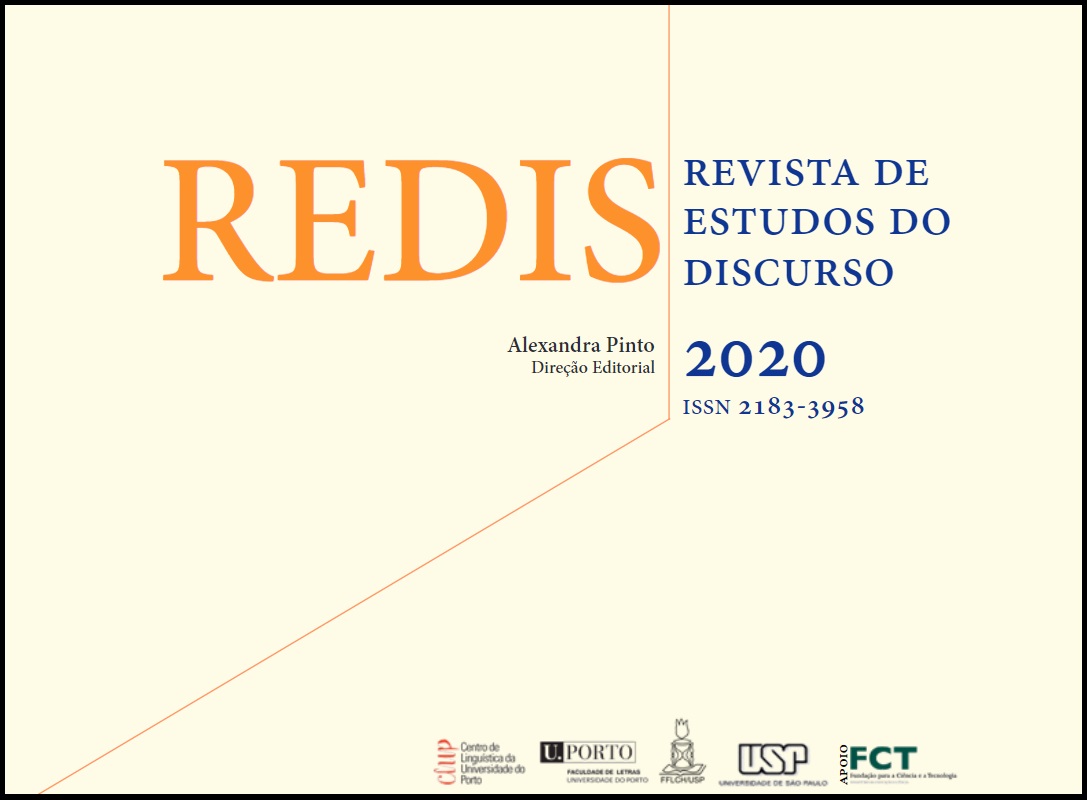Analysis of modifying mechanisms of illocutionary force in opinion texts produced by Chinese students of PFL level B1
DOI:
https://doi.org/10.21747/21833958/red9a4Keywords:
Illocutionary Acts, Modalization, Attenuation, Reinforcement, Second Language / Foreign Language (SL/ FL)Abstract
In this work, carried out on a corpus of opinion texts produced by students of Portuguese as a Foreign Language, at level B1, whose theme focused on a comparative perspective between two cultures, native and host, we proceeded to a descriptive-qualitative analysis of modifying mechanisms of illocutionary force, attenuation and reinforcement, which the students resorted to. The results allowed to observe that the students resort mainly to assertive and expressive acts in the production of opinion texts, regulating their illocutionary force using essentially lexical mechanisms, to the detriment of semantic or morphological mechanisms. In addition, the epistemic modality assumes a predominance in relation to other types, although, in most evidence, there is no validation of the predicative relationship. To support this analysis, we used guiding readings on illocutionary acts (Searle, 1969), on their modalization (Corbari, 2013; Soares, 1998) and, specifically, on attenuation and reinforcement phenomena (Briz & Albelda, 2013; Albelda , 2005) and how they relate to the issue of modality (Campos & Xavier, 1991; Oliveira e Mendes, 2013) and how all these issues are referenced, in terms of pedagogical and didactic approach in the Common Euro-pean Framework of Reference for Languages ( 2001).
References
Albelda, M. (2005). La intensficación em el espanol coloquial. Tesís doctoral. Universitat de Valencia.
Briz, A. & Albelda, M. (2013). Em propuesta teórica y metodológica para el análisis de la atenua-ción linguística em espanol y português. La base de un proyecto em común (ES.POR.ATENUACIÓN). Onomazein: Revista de Lingüística, Filologia y Traducción, 28 (diciembre de 2013), pp. 288-319.
Campos, M.H.C e Xavier, M.F. (1991). Sintaxe e Semântica do Português. Lisboa: Universidade Aberta, (pp. 361-379). Disponível em: https://area.dge.mec.pt/gramatica/umfimtriste/valoresmo-dais10.html
Campos, M.H.C. (2004). A modalidade apreciativa: uma questão teórica. In: Oliveira, Fátima & Duarte, Isabel Margarida (org.). Da língua e do discurso: Homenagem a Joaquim Fonseca. Porto: Campo das Letras, pp. 265-281.
Conselho da Europa (2001). Quadro Europeu comum de referência para as línguas - Aprendizagem, ensino, avaliação. Lisboa: Edições ASA.
Corbari, A. T. (2013). Elementos modalizadores como estratégia de negociação em textos opinativos produzidos por alunos de ensino médio. Tese apresentada ao Programa de Pós-graduação em Letras e Linguística do Instituto de Letras da Universidade Federal da Bahia. Salvador. Universidade Federal da Bahia.
Gomes, C. (2013). Mecanismos de atenuação e intensificação no ensino do Português Língua Estrangeira: um estudo de caso. Dissertação de Mestrado. Porto: Faculdade de Letras da Universidade do Porto.
Gonçalves, M. R. M. (2013). Atos Expressivos e Ensino do Português como Língua Não Materna: O caso do pedido de desculpa e da expressão de um desejo. Dissertação de mestrado em PLE/ LS. Universidade de Coimbra.
Lopes, A. C. M. (2011). Atos de fala e ensino do português como língua materna: algumas reflexões. In: Português, língua e ensino. Porto.
Faria, I. H. (2003). O uso da linguagem. In: Mateus, M. H. M. et alii (2003), Gramática Portuguesa. Lisboa, Editorial Caminho, 6a edição, pp. 55-84.
Oliveira, F. (2003). Modalidade e modo. In: Mateus, M. H. M. et alii (2003), Gramática Portuguesa. Lisboa, Editorial Caminho, 6a edição, pp. 243-272.
Oliveira, F. & Mendes, A. (2013). Modalidade In: Raposo, Eduardo Paiva; Nascimento, Maria Fernanda Bacelar do; Mota, Maria Antónia Coelho da; Segura, Luísa; Mendes, Amália (Organizadores). Gramática do Português. Vol. I. Edição Fundação Calouste Gulbenkian, pp. 623-672.
Searle, J. (1972). Speech Acts, Cambridge: Cambridge University Press; tradução francesa: Les Actes de Langage: essai de philosophie du langage, Paris: Collection Savoir Hermann
Searle, J. (1976). A classification of illocutionary acts. Language in Society: Cambridge University press; vol. 5, n° 1, pp. 1-23. Disponível em: https://sites.duke.edu/conversions/files/2014/09/Searle_ Illocutionary-Acts.pdf
Soares, M. (1996). Modificação de Atos Ilocutórios, em Português. Dissertação de Mestrado em Linguística Portuguesa Descritiva. Porto: Faculdade de Letras da Universidade do Porto.
Downloads
Published
How to Cite
Issue
Section
License
Copyright (c) 2020 Redis: Revista de Estudos do discurso

This work is licensed under a Creative Commons Attribution 4.0 International License.
The authors give to REDIS. Revista de Estudos do Discurso the exclusive right to publish its texts, in any medium, including their reproduction and sale in paper or digital format, as well as their availability in a free access regime in databases.
















